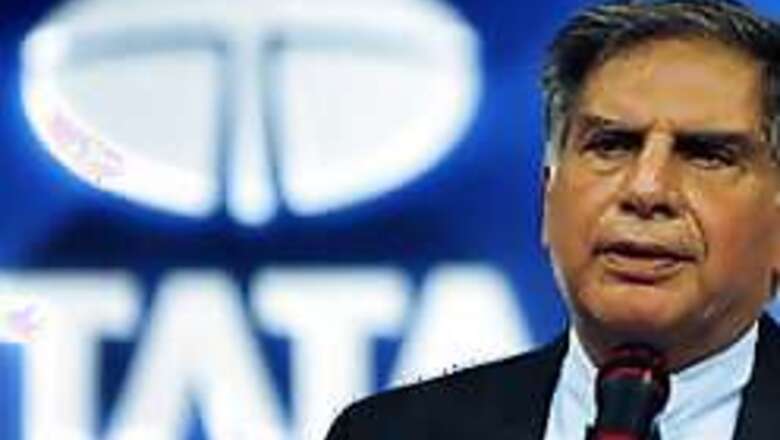
views
Mumbai: Only 10 years ago, India's Tata Motors Ltd unveiled its first car, a hatchback, that established the truck maker's credentials as a carmaker. On Thursday, the $7.8 billion company will unveil its boldest initiative yet, a car that will sell for just $2,500, less than half the cheapest car on the market.
Dubbed the
'People's Car', it will determine Tata's place in the global automotive arena, where the battle is increasingly being fought in emerging economies such as India, China and Russia.
The new model, using re-engineered plastics and modern adhesives, is a far cry from the premium Jaguar and Land Rover brands Tata is negotiating to acquire from Ford Motor Co.
Read All Latest Motown Stories
Tata Motors' drive to produce a cheap, no-nonsense, small car was born from close observation of a local market where millions often ferry families of four, plus baggage, on motorbikes and scooters.
Critics initially derided Tata's Rs 1 lakh price target, more so as oil and steel prices rocketed. But global carmakers have taken note and are scurrying for their own versions to meet growing environmental and cost concerns.
"The product has rightfully gained a lot of international attention," said Mohit Arora, Managing Director for India at research firm JD Power Asia-Pacific, who will fly in from Singapore to see the car being unveiled by Chairman Ratan Tata.
"It's a big, big deal for Tata Motors, and will be recorded in history books, whether or not it does well."
Volkswagen, Toyota Motor Corp, Honda Motor Co and Fiat have since said they are looking to build low-cost cars. And the Nissan Motor Co and Renault alliance, which has done well with its no-frills Logan sedan, is developing a $3,000 car with Bajaj Auto Ltd, a local Tata rival.
"Skepticism has given way to imitation," said Ashutosh Goel, auto analyst at Edelweiss Securities. "Every global car maker has realized the need to be in the emerging markets with a model like this for mass volumes, if not at Rs 100,000, then perhaps at Rs 150,000," he said.
NOSTALGIA WAVE
PAGE_BREAK
The 'People's Car' hits the market at a time when oil prices are near $100 a barrel, a move to fuel-efficient 'green' cars is gaining momentum, and drivers wallow in nostalgia with the revival of the Fiat 500 'Cinquecento' and BMW's Mini.
In Italy, the cheap and efficient Fiat 500 replaced the scooter for millions, and its 2007 relaunch won a warm response.
In India, the mini Maruti 800, made by a venture of the government and Japan's Suzuki Motor, played a similar role in the 1980s, offering a modern alternative to the limited options available.
Today, helped by rising middle-class incomes, small cars, led by models such as Maruti's Alto and the Hyundai Santro, make up more than two-thirds of a domestic car market that should nearly double to 2 million units a year by 2010.
"Small cars have always been popular in India, even when oil prices were low," said Ashvin Chotai, Asian auto analyst based in London, who will be at Thursday's unveiling in New Delhi.
"Globally, higher oil prices are accelerating a shift towards compact and small cars, and regulatory developments such as C02 standards in Europe, and congestion and parking constraints are reinforcing it," he said, adding this was not a short-lived fad.
But environmentalists worry that a car so cheap could be more damaging, adding more pollution and increasing India's dependence on oil imports. Anumita Roychoudhury, at the Centre for Science and Environment in New Delhi, said the shift to greater car ownership could be a 'timebomb ticking away'.
"When you lower the price that drastically, how will you be able to meet safety and emissions standards?" she told The Observer newspaper, adding, to Reuters: "It's just not sustainable, whether from an environmental point of view or in terms of congestion."
Tata, which has said the 4-seater 'People's Car' will have a 600cc engine, will have an initial production run of 250,000 units. It expects eventual annual demand of 1 million cars, which may be assembled by dealers or satellite units.
Tata Motors may also export the car, which would probably sell well in Africa and South and Central America, Chotai said.
INDIA ADVANTAGE
PAGE_BREAK
With car ownership in India at just 8 per 1,000, there is huge potential to upgrade two-wheeler owners, who bought about 7 million bikes and scooters in 2006/07. An entry-level motorbike costs Rs 35,000-40,000.
Already, South Korea's Hyundai, which will have the capacity to make 600,000 cars annually, has made India a small car production hub, and Suzuki is increasing its capacity to 1 million units a year.
"The quality of the initial launch must meet minimum expectations of the global industry, otherwise the whole project could be discredited," Chotai said. But even a thumping success will not have all carmakers rushing to build low-cost models.
"The need for an affordable product exists across markets, but we seldom see a mass shift downward," Arora said, pointing to healthy sales of premium brands in India's booming economy.
Still, Tata is best placed to deliver a small, practical and affordable car. "If Tata can't develop and produce a car at a price of less than $3,000, it's very unlikely any global company will be able to do it," Chotai said, pointing to India's low production costs, cheaper wages and competitive components sourcing.
"And if the vehicle concept can't work in India, it's extremely unlikely to work in any other part of the world."




















Comments
0 comment